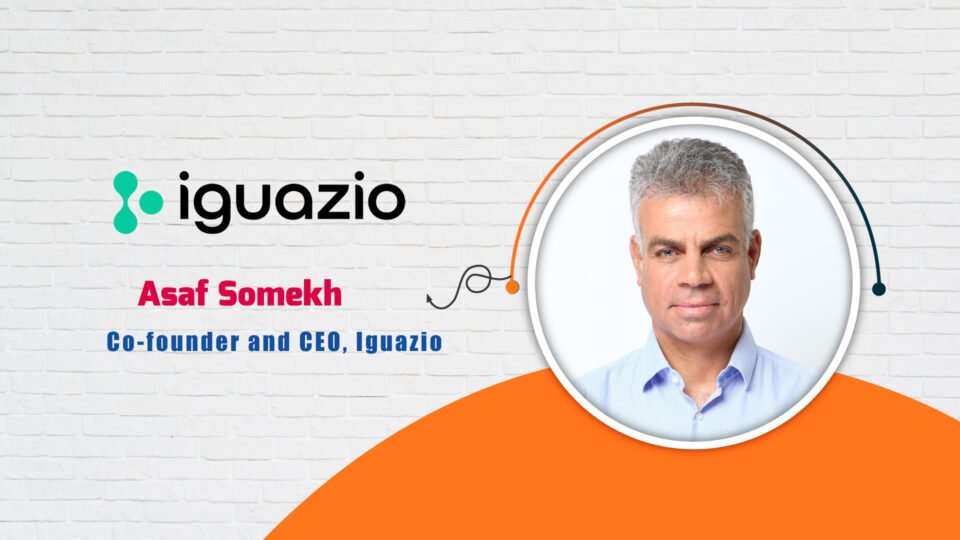Asaf Somekh, Co-founder and CEO at Iguazio talks about how the Data Science Platform transforms AI projects into real-world business outcomes.
1. Tell us about your role at Iguazio. How much of your typical day is involved in innovating AI-based tech for your customers?
As Co-Founder and CEO of Iguazio, I spend much of my time working with customers on innovative AI projects. Most recently, I’ve been working closely with the Sheba Medical Center, one of 10 top hospitals worldwide, on deploying an innovative AI application which predicts COVID-19 patient deterioration based on real-time data. It’s very fulfilling to get to play a part in the innovations our customers are bringing into their organizations with data science, I feel very fortunate to have a front row seat to these transformations which are occurring across industries.
2. What are the applications or rather opportunities you seek to have with your product?
AI and ML practices are no longer the luxury of research institutes or technology giants, they are becoming an integral part of any modern business application. According to industry analysts, most organizations fail to successfully deliver AI-based applications and are stuck in the process of turning data-science models, which were tested on sample or historical data, into interactive applications which work with real-world and large-scale data.
That’s where Iguazio comes in. Iguazio’s data science & MLOps platform enables customers to automate their ML pipelines and create continuous development and delivery (CI/CD) of data and ML intensive applications across hybrid environments (multi-cloud, on prem and edge).
3. What are some of the industries that Iguazio caters to?
We work across industries, for example financial services, retail, smart mobility, telecoms, healthcare, entertainment and ad tech.
4. What are some of the unique lessons you have learnt from analysing your customer behaviour?
Some interesting shifts are taking place in our market right now. As AutoML tools become more prolific, more and more enterprises are entering the AI game, as the value is clear to everyone and now expertise is becoming less of a barrier. This shift creates an increase is the need to get these innovative models to production, which is creating a rise in demand for technologies such as ours.
5. Iguazio and Faktion, together brought data science to production for European Smart Mobility Customers on Azure Cloud. Can you elaborate more on the same?
Yes, with pleasure. Congestion cost the U.K. nearly £8 billion in 2018. This is the main problem Airvi, a start-up which works with cities to regulate and reduce traffic congestion and pollution according to data delivered in real-time, is working to fix. Airvi works with cities to regulate and reduce traffic congestion and pollution using data delivered in real-time. Along with Faktion and using Iguazio’s platform, it is creating virtual, dynamic zones that adapt to fluid air and congestion patterns to better manage traffic. By harnessing data at scale, from sources such as cell phones, pollution sensors, public transportation and other diverse data sources, through Iguazio’s platform, it can recommend dynamic tariffs – that will deter drivers from entering high traffic and pollution zones.
Another joint customer – a Belgian transportation company – is working with the Faktion and Iguazio teams to detect driver fatigue in real-time with behavioural analysis. By factoring in diverse data such as time on the road, time without a break, seasons, facial expressions and other behavioural indicators, this smart mobility company uses AI to proactively mitigate driver fatigue by alerting drivers when it’s time to take a break in order to prevent accidents before they occur.
6. Iguazio recently launched the first integrated feature store within its Data Science Platform to Accelerate deployment of AI in any cloud environment. Can you elaborate more on the same?
Of course. ML Features are properties that are used as inputs to a machine learning model. For instance, a recommendation application might use the total amount per purchase or product category as ones of its many features. Generating a new set of features, called feature engineering, takes a tremendous amount of work. The same features must be used both for training, based on historical data, and for the model prediction based on the online or real-time data. This creates a significant additional data engineering effort and leads to model inaccuracy when the online and offline features do not match, or when models built by different teams use different features or ‘building blocks’. In addition, ML models’ monitoring solutions must be built to track features and results and send alerts of data or model drift. We recently launched the first production-ready integrated feature store, enabling enterprises to catalogue, store and share features centrally, and use them to develop, deploy and manage AI applications across hybrid multi-cloud environments. This saves a massive amount of time, improves efficiency and produces better model accuracy.
7. What are some of the distinctive features of Iguazio? How do you differentiate yourself from the competitors?
Since this is such a hot space, we have seen an influx of competitors enter our market. But many of them are not truly ‘end-to-end’, but cater to a narrow piece of the problem. With Iguazio, you can automate the entire ML pipeline, from development through deployment to management of your AI applications in production. We have also always embraced the open source methodology, and our platform is completely open and integrated. In fact, Iguazio has developed many open source technologies, including MLRun – The MLOps orchestration framework and Nuclio – The serverless framework in Kubeflow – ML Pipelines framework. In addition our ability to handle real-time data and cater to real time use cases and the fact that we are truly hybrid – running on multi-cloud, on prem or at the intelligent edge, as well as our feature store and model monitoring capabilities also differentiate us from other players in the field.
8. What are some of the common pain points that your customers commonly approach you with?
Customers have diverse use cases but the story at the core is always the same – getting models from the lab to a real-world production environment. We’ve helped customers like NetApp, Payoneer and Quadient with use cases as diverse as fraud prevention, predictive maintenance and real-time recommendations, but the core pain was always how to get their AI applications to production faster and more efficiently.
9. What advice would you like to give to the upcoming AI-based tech start-ups?
Do something you love, and do it to create a real difference in the world. It might sound cliché, but when you are passionate about what you do and work with customers who are innovative, you’ll give it your all and create real impact.
10. How does your company keep pace with the exponentially growing AI-based tech space?
We have a super innovative team. Our R&D team, led by my Co-Founders – CTO Yaron Haviv, CPO Yaron Segev and Chief Architect Orit Nissan-Messing are constantly at the bleeding edge of the industry, inventing and innovating proactively as well as tackling any new challenge that comes up (and our customers are demanding and keep us on our toes). This combination keeps us constantly racing ahead.
11. Can you give us a sneak peek into some of the upcoming product upgrades that your customers can look forward to?
We are always working on something new, not just on the commercial front but also on our open source technologies. We’ve made some big advances with MLRun and without giving too much away, you’ll be seeing a lot more of this tool in the near future. We are also continuing to build up our online and offline feature engineering capabilities and taking the feature store to the next level.
12. Which is the one AI-based tech breakthrough you will be on the lookout for in the upcoming year?
I’m watching with great interest as the healthcare industry, particularly now in times of pandemic, continues to innovate with AI, making a real impact on human lives and improving patient care. I’m interested to see where this evolves and how far data science will take us in optimizing the care we as a society are able to provide our community.
13. What is the one quote that has stayed with you throughout your professional life?
“People always find it easier to be a result of the past rather than a cause of the future”

Asaf Somekh
Co-founder and CEO at Iguazio
Asaf Somekh is an Israeli serial entrepreneur who has been at the helm of the tech and data scene for more than twenty years. In 2014, after a successful exit (Voltaire which floated on NASDAQ in 2007 and was later acquired by Mellanox (NASDAQ: MLNX), and several leadership roles at some of Israel’s most important enterprise tech companies Asaf climbed mount Kilimanjaro with one of his co-founders from Voltaire. Together they decided to found Iguazio to address the source of big data projects failing. Today, Iguazio’s data science platform supports enterprises in getting their AI projects from research to production and building real-time AI applications. Iguazio has raised $72M in VC funding and has an international presence in NY, London, Singapore and Israel. Asaf has held various leadership roles in early stage start-ups as well as public corporations in R&D, Marketing and Business Development. Asaf has an MBA from IMD in Switzerland and a BSc in computer engineering from the Technion Israel Institute of Technology.

